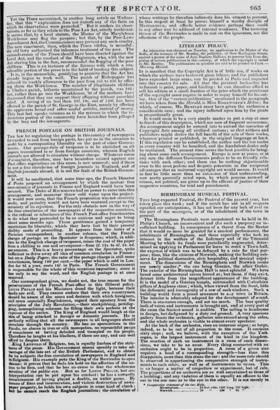FRENCH POSTAGE ON BRITISH JOURNALS.
THE law for regulating the postage in this country of newspapers forwarded to and from foreign parts, has put us in the situation to
profit by. a corresponding 'liberality on the part of other Govern- ments. Our postage-duty of twopence is to be abolished on all papers transmitted to or from foreign countries, wherein English journals are allowed to circulate without charge. Whatever cause of complaint, therefore, may have heretofore existed against our Post.office regulations on this score, is now removed; and if there be not a free circulation of foreign journals in England, and of English journals abroad, it is not the fault of the British Govern- ment.
It will be recollected, that some time ago, the French Director of Posts proposed an arrangement by which the mutual free transmission of journals in France and England would have been
secured. The Duke of RICHMOND had no power to enter into this arrangement, and moreover threw cold water upon the project.
It would now seem, that the French proposition was not sincerely made, and probably would not have been ventured except in the certainty of its rejection. For the only obstacle now in the way of the free circulation of the newspapers of the respective countries, is the refusal or reluctance of the French Post-office functionaries to do what they pretended to be so anxious and eager to bring about some months ago. These gentlemen gained a temporary reputation for liberality, which they have lost by their present shabby mode of proceeding. It appears from the letter of a Parisian correspondent, in another column, that the French
charge of postage on the Spectator is fivepence; which, in addi- tion to the English charge of twopence, raises the cost of the paper
from a shilling to one and sevenpence—from 2/. 12*. to 4/. 28. 4d.
per annum. This is a heavy percentage on the Spectator, quite sufficient to drive away all idea of common circulation in France ; but on a Daily Paper, the ratio of the postage charge is still more extortionate, being 100 per cent.—the paper which is sold in Lon- don for 91. a year, -costs 18/. in Paris. The French Government
is responsible for the whole of this vexatious imposition; since it has only to say the word, and the English postage is at once removed.
. Our correspondent gives, we doubt not, the true reason for the perseverance of the French Post-office in this illiberal policy. Louts PHILIP and his Ministers dread the light, because their deeds are evil. They cannot endure that their own countrymen should be aware of the scorn and derision with which foreigners,
and more especially Englishmen, regard their apostacy from the principles of the July Revolution,—their stockjobbing, pettifog- ging, monopolizing schemes for filling their own pockets at the expense of the nation. The King of England would laugh at the
idea of being attacked in foreign or domestic journals. He is perfectly willing that all the newspapers in all languages should
circulate through the country. He has no speculations in the Funds, no shares in iron or silk monopolies, no reproachful pangs of conscience at having deluded and trampled on his people. Therefore lie laughs at his libellers, if there are any, and can well afford to despise them. King LEOPOLD of Belgium, too, is equally fearless of the stric- tures of the press. His Government means speedily to take ad- vantage of the late act of the British Parliament, and to obtain for its subjects the free circulation of- newspapers in England and in Belgium. His example puts the King of the Barricades to open shame.: it proves that he feels his hold on the affection of the na- tion to be firm, and that he has no cause to fear the wholesome scrutiny of the public eye. But as for Louts PHILIP, but one interpretation can he put upon his conduct: he has a cowardly consciousness of having played a double, an Unfair game. By means of fines and incarceration, and violent destruction of news- Paper property, he holds his own subjects in some kind of cheek ; but he cannot reach the Krtglish journalists; the circulation of whose writings he therefore indirectly does his utmost to prevent. In this respect at least he proves himself a worthy disciple of MiorrEasocit, and affords better evidence perhaps than could in any other way be adduced of internal weakness. The tottering throne of the Barricades is made to rest on the ignorance, not the affections of the people.
















 Previous page
Previous page